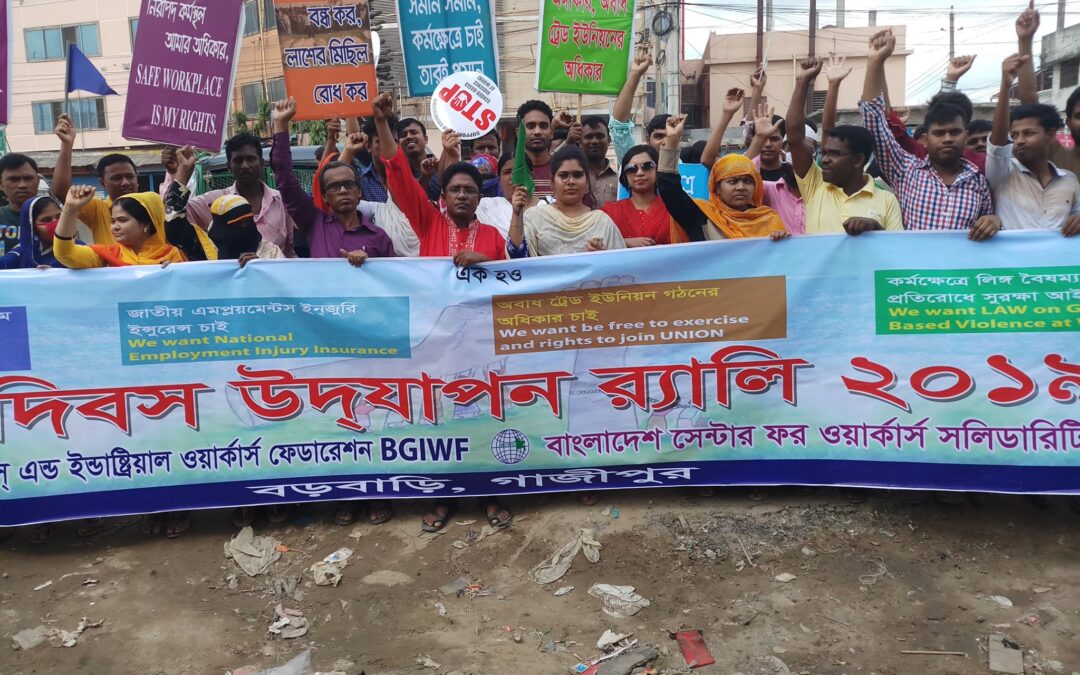
Jun 24, 2024
Marking the one-year anniversary of the murder of Bangladesh union leader Shahidul Islam, the Solidarity Center is demanding that the police investigation of his case be reopened to ensure that the main perpetrators of the crime are held accountable and that the persistent harassment and unfair labor practices committed against worker leaders in the country end.
A dedicated trade union organizer and leader of the Bangladesh Garment and Industrial Workers Federation (BGIWF), Shahidul was brutally attacked outside Prince Jacquard Sweaters Ltd. factory on June 25, 2023, in retaliation for his efforts to help workers claim their hard-earned, long overdue wages and benefits. He succumbed to his injuries in a local hospital.
Just 45 years old at the time of his death, Shahidul is survived by his wife, also a former union organizer, and two school-age children. He was the sole wage earner for his family. With bills, school fees and her cancer treatments to pay for, Shahidul’s wife is struggling to get by.
While police in February submitted a charge sheet to the Gazipur court accusing 14 individuals in the murder of Shahidul Islam, including one administrative management official from Prince Jacquard Sweaters Ltd., trial dates remain to be set and the investigation is ongoing. Though it is positive to see that police have established a clear link between factory management and the crime, labor rights groups and Shahidul’s family argue that the investigation did not go far enough and that higher-level company officials were likely involved.
“Shahidul Islam knew that without organizing rights, workers cannot collectively bargain for better wages and working conditions in far-flung supply chains,” said Solidarity Center Executive Director Shawna Bader-Blau. “Today as we honor the legacy and memory of Shahidul, we stand united with trade unions and labor rights advocates everywhere in demanding justice for him and protection for the many committed organizers, workers and trade union leaders like him working to shift power dynamics and build worker power in the Bangladesh garment sector—the changes that he died fighting for.”
She added, “There is no alternative to strengthening protections for trade unionists so that they can exercise their fundamental rights without fear of retaliation or violence. And despite the many obstacles, we hope that change is coming.”
The Way Forward
Because of brave organizers like Shahidul Islam, the Solidarity Center has documented the formation of at least 134 independent garment sector trade unions since 2015.
In light of the culture of impunity for worker rights violations that led to his untimely death, the Solidarity Center calls for accountability, justice and transformation. We also call on:
- Brands sourcing from Prince Jacquard Sweaters Ltd. factory to take responsibility for their contribution to the conditions that led to Shahidul Islam’s murder by providing financial compensation to Shahidul’s family. All brands, regardless of whether they were directly or indirectly sourcing from Prince Jacquard, should recognize that their own supply chains are vulnerable to such a horrific event and should take concrete steps to monitor for and take swift action to address wage theft and any violations of freedom of association that occur.
- The government of Bangladesh to ensure that workers’ right to freedom of association is upheld, as the free exercise of this right can safeguard workers and organizers from the kind of violence that killed Shahidul Islam. Concerted action in this area will demonstrate the government’s commitment to upholding fundamental labor rights.

Jun 24, 2024
Over a 25-year career, Shahidul successfully mobilized thousands of workers to join trade unions and empowered them to represent their co-workers as factory-level leaders. As a young man he experienced the grueling reality of work in a garment factory. Overworked and underpaid, and despite the risk of management reprisal, Shahidul decided to take action to build a better future for himself and workers like him by joining the Bangladesh Independent Garment Workers Union Federation (BIGUF) in the late 1990s.
Shahidul learned the ropes of union organizing as a participant in the Solidarity Center’s three-year organizing internship program, enhancing his skills to build worker power. Subsequently, he joined the Bangladesh Garment and Industrial Workers Federation (BGIWF), rising to the rank of president of the Gazipur District Committee. His influence extended to Gazipur, Rampura in Dhaka, and Narayangonj District, where he facilitated the formation of numerous factory-based trade unions, empowering workers to raise their voices for better wages and working conditions. As a trained paralegal of the Solidarity Center, he championed workers in claiming wages and benefits wrongfully denied by their employers. His remarkable ability to motivate and mobilize workers, collaborate with diverse stakeholders and navigate government processes significantly impacted the Bangladesh labor movement.
How did it come to this? Lack of accountability, fear and repression
Shahidul Islam was killed outside Prince Jacquard Sweaters Ltd., a factory producing for buyers in Europe and North America, and a member of the Bangladesh Garment Manufacturers and Exporters Association (BGMEA). Prince Jacquard did not yet have a trade union, though Shahidul’s federation, BGIWF, had started supporting workers to organize not long before his death.
The global garment supply chain is notorious for its exploitation, sourcing from low-wage, minimally regulated countries where factories are rife with wage theft, union busting, forced overtime and other abuses. Multinational fashion brands outsourcing work overseas exercise economic power over suppliers—often under threat of yanking orders and moving production to more compliant factories—and make demands that lead to worker abuse but boost the brand’s bottom line. At the same time, these companies claim a hands-off relationship with suppliers in regard to workplace safety and basic worker and human rights, often hiding behind the façade of “corporate social responsibility” programs and audits. Indeed, Prince Jacquard Sweaters Ltd. had undergone outside audits by two different firms, Amfori and Sedex.
Organizing an independent, democratic union that can represent the rights of workers and help them negotiate with their employers over issues like wage and benefit payments, can be a dangerous endeavor in Bangladesh. Once organized, the trade union registration process in Bangladesh is complicated, time consuming and plagued by corruption and interference from employers and their powerful associations. Workers regularly face unfair labor practices, such as illegal terminations, threats, harassment and violence. As in the case of Shahidul Islam, it is not uncommon for employers to hire local musclemen or mercenary members of management-dominated “yellow” unions to attack workers and organizers to prevent them from exercising their right to freedom of association.
In fact, in the absence of due process for resolving collective disputes between workers and employers, efforts by workers to collectively stand up for their rights are often ignored or met with retaliation. Mere months after Shahidul’s murder, four more workers lost their lives and many more were severely injured during the 2023 workers’ protests for a fair wage. This calls into question the reports about progress on freedom of association in Bangladesh.
Meanwhile, the majority of global brands and buyers sourcing from Prince Jacquard Sweaters have remained unresponsive to repeated outreach by labor rights organizations calling on them to provide compensation to the family of Shahidul Islam, while those who did respond deny responsibility.

Jun 27, 2023
June 27, 2023
The Solidarity Center joins the U.S. and international labor movements in condemning the brutal murder of Shahidul Islam, a worker leader who was killed as a result of his labor rights activism in Gazipur, Bangladesh. Shahidul, a member of the Bangladesh Garment and Industrial Workers Federation (BGIWF), fought for worker rights throughout his 25-year-long journey as a trade union organizer and died fighting for what he believed in.
According to the first information report of the case filed at the Tongi (West) Police Station, Shahidul, president of BGIWF’s Gazipur district committee, was attacked after leaving a meeting with workers at a Prince Jacquard Sweaters Ltd. factory. Shahidul and workers had met to discuss how to ensure the payment of two and half months’ wages and the Eid-ul-Azha festival bonus. According to the report, after Shahidul and other union representatives left the factory premises, a group of people attacked them, shouting, “You are here for workers’ pay!” The assailants reportedly started viciously punching and kicking Shahidul, leaving him critically wounded. Bystanders took him to a nearby hospital where he was declared dead.
Eleven years ago, in April 2012, another worker leader, Aminul Islam, was tortured and murdered. Aminul was BGIWF president and an organizer with Bangladesh Center for Workers’ Solidarity (BCWS) and a key player in the country’s movement to advance worker rights. The Solidarity Center knew both Shahidul and Aminul personally, and for decades admired their dedication to the worker movement.
Murder of trade unionists is the most extreme and horrific form of anti-union violence, and has a chilling effect on freedom of association. In a country where some employers systematically prevent independent unions from representing workers, the fear stoked by a second horrific murder of a BGIWF leader will undoubtedly make the task of organizing trade unions in Bangladesh even more difficult. Shahidul’s murder this week and Aminul’s murder over a decade ago underscore the absence of an environment where workers can freely exercise their rights without intimidation.
The Solidarity Center joins BGIWF in demanding that all stakeholders, including global brands sourcing in Bangladesh, hold suppliers accountable to basic human rights standards in garment factories. And we call on the government of Bangladesh to step up their protection of trade unionists who are exercising their fundamental rights to organize—rights protected under Bangladesh and international law.
The Solidarity Center stands in solidarity with BGIWF in demanding justice for Shahidul Islam and safety for workers and union members who continue the struggle to defend the rights of workers at the Prince Jacquard Sweaters Ltd. factory and in workplaces across Bangladesh. We express our condolences and solidarity to Shahidul’s family, co-workers and union brothers and sisters.
About Shahidul Islam
Shahidul Islam Shahid, 45, was born at Rajabari in Gazipur’s Sreepur. He began working in the garment industry at the age of twenty. Noticing sheer negligence toward worker rights, he began working as an organizer and became a union leader. From 1999 to 2002, he worked alongside Bangladesh Independent Garment Workers’ Union Federation (BIGUF). In 2006, he joined Bangladesh Center for Workers’ Solidarity (BCWS) as a senior organizer and worked there till 2012. The same year, he became a senior organizer at BGIWF, and later became the president of its Gazipur District Committee. Throughout his career, Shahid successfully mobilized thousands of workers to join unions and empowered them to become solid factory-level leaders. He also assisted thousands of workers to receive arrears and severance pay wrongfully denied by their employers. His contributions to the labor movement were truly remarkable. His murder serves as a reminder of the terrible odds garment workers are up against in Bangladesh and represents an immense loss for the labor movement.



